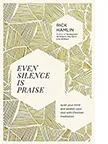I lay in a hospital bed, a monitor attached to my chest counting every beat of my heart. Hours earlier, I’d awakened at home barely able to breathe. “Get to the ER immediately,” my doctor said.
The ER was a din of voices and machines. The man in the next bed had his TV at top volume. The noise made prayer impossible.
Not that I was much good for prayer right now. My only thought was a plaintive Why me? I’d had open-heart surgery years earlier to replace a defective valve. I did everything doctors tell you to do. Ate healthily. Exercised.
It wasn’t fair. My younger son, Tim, was getting married in a month. My wife, Carol, and I had just returned from seeing family in California, and all kinds of work had piled up. I was even trying to wrap up final edits on a book I’d written…about prayer!
Would my heart force me to cancel everything? Was the problem even more serious?
I stopped myself before the next Why me? My chaotic thoughts were swirling around one overriding emotion: fear.
I kept seeing the expression on Carol’s face that morning as I gasped for breath. Fear and helplessness. Exactly what I was feeling now.
My symptoms had stabilized, but I knew something was wrong and it would take a cardiologist to diagnose the problem. The hospital was jammed, and everything was taking forever.
The wait was intolerable.
At last I looked at a clock. Two-thirty in the morning.
My new book, Even Silence Is Praise, explores the ancient practice of contemplative prayer. In plainer words, it’s about listening to God instead of talking at him.
Lying there with my jangling thoughts, I realized I needed to follow my own advice. I got out of bed—the heart monitor was portable and my breathing seemed okay—and padded out into the hall. I found an empty cot in an out-of-the-way place, lay down and stared at the acoustic-tiled ceiling.
It was a relief to be away from that TV, but the noise in my head was just as loud. Anxiety. Fear. Anger.
Contemplative prayer is simple—it’s basically a Christian form of meditation—and I’ve been doing it for years. You quiet your brain and slowly repeat a single word—God, Jesus, faith, peace or whatever works for you. Do that for 10 or 20 or 30 minutes. When all goes well, you enter a state of deep relaxation. Your mind settles down. You stop talking to God and, for once, truly listen.
Ah, but if you’re like me, what sounds simple is actually quite hard. Quiet my brain? Ha! Stop worrying? Stop thinking about those deadlines and petty resentments and the grocery list and that friend I forgot to call?
Over the years, I’ve developed some strategies for quieting my inner voice.
In the hospital, all I wanted to do was beg God for help. But I knew I needed more than that. I needed God’s reassuring voice. So I tried to put into practice what I’d just finished writing about in the book.
Here’s what I tried. I’ll tell you how it worked out.
1. Visualize peace.
Worries are among the loudest voices in our head, especially in a crisis. They make it hard even to start to pray. In my book, I write that the best thing to do with worries is to “give them over to God.” Easier said than done.
One way is to picture myself physically doing this. Lying on that hospital cot, I visualized a healing pool of water, like the one at Bethesda. I sank into the pool, imagining God soothing my fears and quieting my soul like the water flowing over my skin.
It worked. My body, which had been on high alert, relaxed and my head began to clear.
Images can do this precisely because they are not words. Picture how you want to feel and your mind will often go along.
2. Meditate on the Word.
Once you’ve cleared out your own clamoring words, it’s time to replace them with God’s words.
If you’re someone who memorizes Scripture, call forth a favorite passage. Even a single phrase or word can work.
In the hospital, I focused on one phrase: Be still and know that I am God. I repeated those words, each time shortening the sentence:
“Be still and know.”
“Be still.”
“Be.”
The power and goodness of God came through.
3. Acknowledge distractions and let them go.
When I first tried contemplative prayer, I felt terrible at it—I could achieve a quiet state for only moments at a time. Thoughts and worries kept reappearing. Why couldn’t I make them go away?
I’ve learned that distractions never go away. Even the most experienced practitioner of prayer lives with a chorus of inner voices. The key is to stop worrying about that.
When a distracting thought comes up, acknowledge it, then give it to God. If it bounces out of God’s hands and comes back to you, do it again. You might spend your whole prayer time doing only that. Doesn’t matter. You’re thinking about God, right?
The more I gave my worries to God, the more I felt him there with me in the hospital. Just the repeated process of giving myself to God was itself a form of prayer.
4. Put away your phone.
This sounds obvious, but you’d be surprised how easy it becomes to assume you need some device to help you pray. Technology can be wonderful for connecting us to loved ones or enabling us to access Scripture on the go.
But remember that people have been praying for thousands of years before the invention of prayer apps. I’m often tempted to get out my phone to remind me of the exact phrasing in a Bible passage or some words of wisdom from a book I’ve read recently.
Don’t do it. God is not in the phone; God is already with you. Inner silence will enable you to remember that and feel God’s presence most fully.
5. Pray for others.
Once your mind is quiet and you have become aware of God’s presence, you can turn your attention to where God’s heart is—his ceaseless redemptive work, which you are part of.
Think of people in your life who need God’s healing or helping touch. In the hospital, I immediately thought of Carol.
You don’t have to tell God what to do for someone. God already knows what to do. Just bring the person into your mind, and imagine God at work in their life.
I pictured Tim and Henley, nervous and excited about the momentous next step in their life together. I pictured my older son and his wife.
I pictured my siblings and their families, whom I’d seen in California, all with their own joys and sorrows.
My cardiologist and the other patients under his care.
The doctors and nurses hard at work helping others in the hospital.
The more you bring people in your life into God’s presence, the more you will settle into the idea that God is at work everywhere. Including right where you are praying.
The ultimate goal of contemplative prayer is to give you an experience of God as God is. Not the God you pester with demands or try to marshal to your side in some dispute.
The living God, the creator of the universe, there with you wherever you are.
I was in the ER for 36 hours. Eventually, the cardiologist arrived and diagnosed the problem. I needed a replacement for the artificial valve I’d gotten 14 years earlier.
This time, the surgery was minimally invasive. I was breathing fine and feeling like a new person one day later.
But, really, the renewal had already happened on that cot in the hospital hallway. By the time I saw the cardiologist, the fear that had ruled my mind and spirit was gone.
I had given it to God, along with everything else. I had quieted my mind, focused on a few words from Scripture and turned my attention to the people in my life who needed God just as much as I did.
God met me in that quiet place. I hope, with the help of contemplative prayer, he will meet you too in your time of need.
Rick Hamlin is the author of Even Silence Is Praise: Quiet Your Mind and Awaken Your Soul with Christian Meditation.
For more inspiring stories, subscribe to Guideposts magazine.







